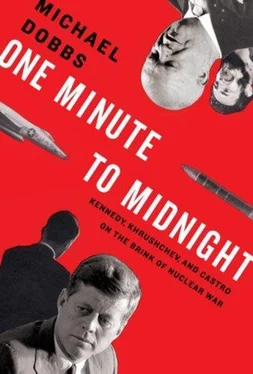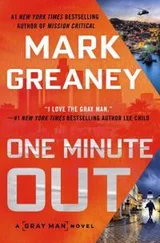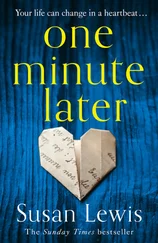News that the Soviets were constructing missile bases on Cuba could hardly have come at a worse time. During the 1960 presidential election, Kennedy had used Cuba as a stick to beat the Republicans, accusing the Eisenhower government of doing nothing to prevent Fidel Castro from transforming the island into “a hostile and militant Communist satellite.” Now that the Democrats were in power, the political roles were reversed. Republican politicians were seizing on reports of a Soviet military buildup on Cuba to denounce Kennedy for weakness and fecklessness. Just two days earlier, Kennedy had sent Bundy out on nationwide television to knock down a claim by the Republican senator from New York, Kenneth B. Keating, that the Soviets would soon be able “to hurl rockets into the American heartland” from their Caribbean outpost.
Kennedy’s immediate reaction on learning from Bundy that Khrushchev had double-crossed him was to sputter, “He can’t do this to me.” An hour later, he walked into the office of his appointments secretary, Kenny O’Donnell, and announced glumly, “Ken Keating will probably be the next president of the United States.”
Determined to keep the information secret as long as possible, Kennedy decided to stick to his regular schedule, acting as if nothing was amiss. He showed off Caroline’s pony Macaroni to the family of a returning astronaut, chatted amiably for half an hour with a Democratic congressman, and presided over a conference on mental retardation. It was not until nearly noon that he managed to break away from his ceremonial duties and meet with his top foreign policy advisers.
Kennedy conceded that he was mystified by Khrushchev. Alternately ingratiating and boorish, friendly and intimidating, the metalworker turned superpower leader was unlike any other politician he had ever encountered. Their single summit meeting—in Vienna, in June 1961—had been a brutal experience for Kennedy. Khrushchev had treated him like a little boy, lecturing him on American misdeeds, threatening to take over West Berlin, and boasting about the inevitable triumph of communism. Most shocking of all, Khrushchev did not seem to share his alarm about the risks of nuclear war, and how it could be triggered by miscalculations on either side. He spoke about nuclear weapons in a casual, offhand kind of way, as simply one more element in the superpower competition. If the United States wants war, he blustered, “let it begin now.”
“Roughest thing in my life,” Kennedy had told James Reston of The New York Times, after it was all over. “He just beat the hell out of me.” Vice President Lyndon B. Johnson was contemptuous of his boss’s performance. “Khrushchev scared the poor little fellow dead,” he told his cronies. British prime minister Harold Macmillan, who met with Kennedy shortly after he left Vienna, was only slightly more sympathetic. He thought that the president had been “completely overwhelmed by the ruthlessness and barbarity of the Russian Chairman.” For the first time in his life Kennedy had met a man “who was impervious to his charm,” Macmillan noted later. “It reminded me in a way of Lord Halifax or Neville Chamberlain trying to hold a conversation with Herr Hitler.”
Part of the problem lay in Kennedy’s own miscalculations as president. The biggest mistake of all was the Bay of Pigs. In April 1961, four months after taking office, he had authorized an invasion of Cuba by fifteen hundred CIA-trained Cuban exiles. But the operation was disastrously planned and executed. Castro mounted a vigorous counterattack, trapping the exiles in an isolated beachhead. Anxious to conceal official American involvement as much as possible, Kennedy refused to order U.S. ships and planes stationed just offshore to come to the rescue of the outnumbered invaders, most of whom ended up in Castro’s jails. As Kennedy later confessed to Reston, his superpower rival had no doubt concluded that “I’m inexperienced. Probably thinks I’m stupid. Maybe most important, he thinks that I had no guts.” The perception of an inexperienced leader with no guts was one that he had been struggling to reverse ever since.
The news from Cuba reinforced Kennedy’s impression of Khrushchev as a “fucking liar.” He complained to his brother that the Soviet leader had behaved like “an immoral gangster… not as a statesman, not as a person with a sense of responsibility.”
The question was how to respond. They would definitely step up U-2 reconnaissance of the island. Military options ranged from an air strike targeted on the missile sites alone to an all-out invasion. General Taylor warned that it would probably be impossible to destroy all the missiles in a single strike. “It’ll never be a hundred per cent, Mr. President.” Any military action was likely to escalate quickly to an invasion. The invasion plan called for as many as a hundred and fifty thousand men to land in Cuba a week after the initial air strikes. In the meantime, the Soviets might be able to launch one or two nuclear missiles against the United States.
“We’re certainly going to do [option] number one,” Kennedy told his aides grimly, referring to the air strike. “We’re going to take out those missiles.”
TUESDAY, OCTOBER 16, 2:30 P.M.
Robert Kennedy still had an angry glint in his eye later that afternoon when he met the men in charge of America’s secret war against Fidel Castro in his cavernous Justice Department office. He was determined to make clear the president’s “dissatisfaction” with Operation Mongoose, which had been under way for a year, achieving virtually nothing. Countless acts of sabotage had been planned, but none had been carried out successfully. Fidel and his bearded revolutionaries were still in power, inflicting daily humiliations on the United States.
Officials from the CIA, the Pentagon, and the State Department were arrayed in a semicircle in front of the attorney general. A fresh assortment of his children’s watercolors decorated the walls, along with standard-issue government art. One of the documents on the untidy, paper-littered desk was a two-page memorandum captioned “SECRET MONGOOSE” with the latest ideas for fomenting an insurrection inside Cuba. It had been put together by the CIA in response to prodding from the Kennedy brothers to be much more “aggressive.” RFK nodded approvingly as he glanced through the list:
• Demolition of a railroad bridge in Pinar del Rio province;
• Grenade attack on the Chinese Communist embassy in Havana;
• Mine the approaches to major Cuban harbors;
• Set an oil tanker afire outside Havana or Matanzas;
• Incendiary attacks against oil refineries in Havana and Santiago.
The attorney general title masked Bobby’s true role in government, which was closer to that of deputy president. His extracurricular responsibilities included heading a secret committee known as the Special Group (Augmented), whose goal was to “get rid of” Castro and “liberate” Cuba from Communist domination. The addition of the president’s brother to the group—signified by the cryptic word “Augmented”—was a way of emphasizing its importance to the rest of the bureaucracy. Soon after taking personal control of Operation Mongoose in November 1961, Bobby had decreed that “the Cuban problem carries top priority in the U.S. government. No time, money, effort, or manpower is to be spared.” By coincidence, he had arranged a long-scheduled review of covert action plans against Cuba the very day that Soviet missiles were discovered on the island.
Bobby chose his words carefully as he addressed the Special Group. Half the officials in the room were unaware of the latest developments, and the president had stressed the need for total secrecy. But it was difficult for him to conceal his anger as he talked about “the change in atmosphere in the United States government during the last twenty-four hours.” Frustrated by the lack of “push” in getting on with acts of sabotage, he announced that he planned to devote “more personal attention” to Mongoose. To accomplish this, he would meet with the Mongoose operational team every morning at 9:30 until further notice.
Читать дальше












